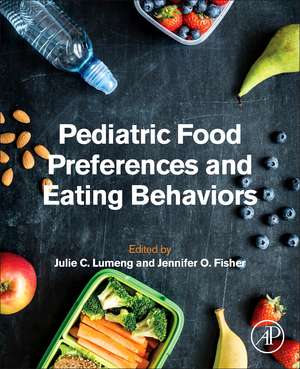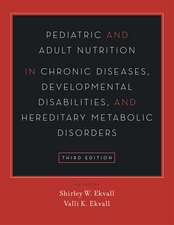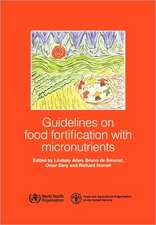Pediatric Food Preferences and Eating Behaviors
Editat de Julie C. Lumeng, Jennifer O. Fisheren Limba Engleză Paperback – 8 iul 2018
Written by leading researchers in the field, each chapter presents basic concepts and definitions, methodological issues pertaining to measurement, and the current state of scientific knowledge as well as directions for future research.
- Delivers an up-to-date synthesis of the research evidence addressing the development of children’s eating behaviors, from birth to age 18 years
- Provides an in-depth synthesis of the basic eating behaviors that contribute to consumption patterns
- Translates the complex and sometimes conflicting research in this area to clinical and public health practice
- Concludes each chapter with practical implications for practice
- Presents the limits of current knowledge and the next steps in scientific inquiry
Preț: 719.30 lei
Preț vechi: 878.60 lei
-18% Nou
137.66€ • 143.18$ • 113.64£
Carte tipărită la comandă
Livrare economică 07-21 aprilie
Specificații
ISBN-10: 0128117168
Pagini: 318
Dimensiuni: 191 x 235 x 21 mm
Greutate: 0.55 kg
Editura: ELSEVIER SCIENCE
Public țintă
food and nutrition researchers, graduate and undergraduate courses/training programs focused on nutrition, health behavior, and health education, clinicians (including dietitians and nutritionists), other health care professionalsCuprins
1. Measuring Sweet and Bitter Taste in Children: Individual Variation due to Age and Taste Genetics
Julie A. Mennella, Alissa A. Nolden, Nuala Bobowski
2. Learning to Like: Roles of Repeated Exposure and Other Types of Learning
Stephanie Anzman-Frasca, Sarah Ehrenberg
3. Effects of Modeling on Children’s Eating Behavior
J. Blissett
4. Children’s Challenging Eating Behaviors: Picky Eating, Food Neophobia,and Food Selectivity
Susan L. Johnson, Kameron J. Moding, Laura L. Bellows
5. Satiety Responsiveness and Eating Rate in Childhood: Development, Plasticity, and the Family Footprint
Brenda Burgess, Myles S. Faith
6. Role of Reward Pathways in Appetitive Drive and Regulation
Ashley N. Gearhardt
7. Appetitive Traits: Genetic Contributions to Pediatric Eating Behaviors
Alexis C. Wood
8. The Influence of the Food Environment on Food Intake and Weight Regulation in Children
Tanja V.E. Kral
9. Parenting Influences on Appetite and Weight
Sheryl O. Hughes, Thomas G. Power
10. Executive Function and Self-Regulatory Influences on Children’s Eating
L.A. Francis, N.R. Riggs
11. Neurocognitive Influences on Eating Behavior in Children
Kathleen L. Keller, Amanda S. Bruce
12. Development of Loss of Control Eating
Meghan Byrne, Marian Tanofsky-Kraff
13. Intentional Self-Regulation of Eating Among Children and Adolescents
Katherine W. Bauer, Sam Chuisano
14. Food Cognition and Nutrition Knowledge
Jasmine M. DeJesus, Katherine D. Kinzler, Kristin Shutts
Descriere
Pediatric Food Preferences and Eating Behaviors reviews scientific works that investigate why children eat the way they do and whether eating behaviors are modifiable. The book begins with an introduction and historical perspective, and then delves into the development of flavor preferences, the role of repeated exposure and other types of learning, the effects of modeling eating behavior, picky eating, food neophobia, and food selectivity. Other sections discuss appetite regulation, the role of reward pathways, genetic contributions to eating behaviors, environmental influences, cognitive aspects, the development of loss of control eating, and food cognitions and nutrition knowledge.
Written by leading researchers in the field, each chapter presents basic concepts and definitions, methodological issues pertaining to measurement, and the current state of scientific knowledge as well as directions for future research.
- Delivers an up-to-date synthesis of the research evidence addressing the development of children’s eating behaviors, from birth to age 18 years
- Provides an in-depth synthesis of the basic eating behaviors that contribute to consumption patterns
- Translates the complex and sometimes conflicting research in this area to clinical and public health practice
- Concludes each chapter with practical implications for practice
- Presents the limits of current knowledge and the next steps in scientific inquiry


























